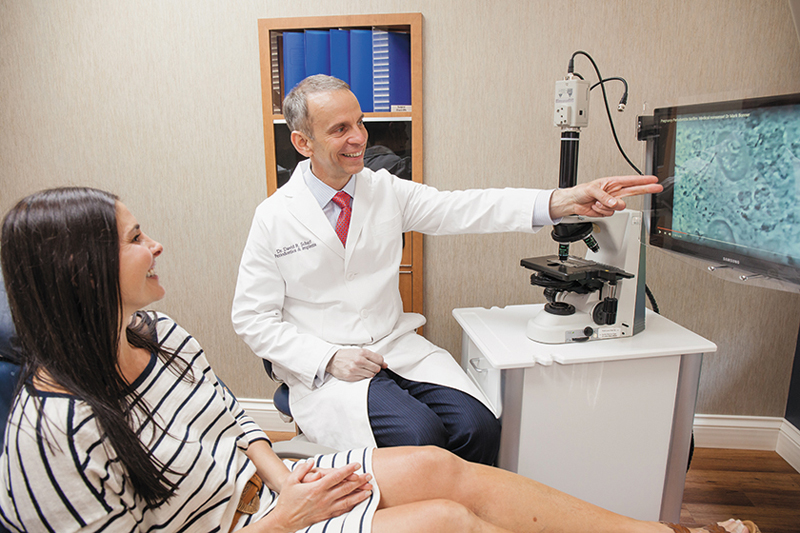
Frequently Asked Questions About Dental Implants
Click above to see reviews.

If you are interested in receiving dental implants, you might have questions about placement procedures and maintenance. Here are answers to common questions.
What Are Dental Implants?

A tooth that has become badly infected often needs to be removed to prevent the infection from spreading. A tooth extraction is considered the most invasive of all dental procedures since it does completely remove the tooth. However, dental implants are one of the top dental procedures to consider.
Dental implants are considered an ideal replacement for a missing tooth. Using a titanium screw, it is surgically positioned into the jawbone. The jawbone will fuse with the titanium, becoming strong enough to support a tooth. Once the jawbone has fused with the titanium, a dentist will be able to create a false tooth that is attached to an abutment on the titanium implant. Dental implants look and feel like traditional teeth as they are anchored within the bone and will not become loose like dentures and bridges can.
Am I a Candidate for Dental Implants?
To receive dental implants, you will need to schedule a consultation with our office. We must take X-rays and determine if the jawbone is strong enough to support an implant. Your oral health will be considered as we look for problems that may cause an implant to fail. Failure to have enough jawbone density may require patients to receive surgery like ridge enhancements or bone grafts to build up the jawbone and make it strong enough. As long as the bone grafting is successful and the gums are healthy, patients are usually cleared for dental implant surgery.

Although there are certain instances where dental implants can’t be placed immediately, Dr. Scharf can help most people become viable candidates. Some issues that might delay dental implant placement:
- Uncontrolled Illnesses: In order for dental implants to anchor and heal successfully, patients should be generally healthy and free of disease. Certain health problems, including cancer, hemophilia, diabetes, and autoimmune disorders can disrupt a person’s ability to heal after surgery.
- Certain Medications: Some patients who take certain medications may not be right for dental implants. For example, chemotherapy drugs, bisphosphonates, and corticosteroids all have been shown to affect how tissue responds to dental implant surgery.
- Ongoing Dental or Periodontal Problems: To be a good candidate for dental implant surgery, patients should have generally healthy teeth and gums. Otherwise, the infection is likely to migrate to the implant site and interfere with integration.
- Insufficient Bone Mass or Density: The jawbone tissue needs to be wide, deep, and strong enough to support a dental implant. Bone mass tends to recede after teeth are lost, so patients who have been living with missing teeth for a while may require bone grafts before implants can be placed.
- Lifestyle Habits: Poor oral hygiene, excessive drinking or smoking can affect dental implant healing. Patients should maintain an excellent dental hygiene routine before, during, and after surgery. Dental implant surgery is a multi-stage process that can take 4-12 months to complete, patients need to be committed to not smoking or drinking for this timeframe, or they risk dental implant failure.
Why See A Periodontist for Dental Implants, Not A General Dentist?

A Periodontist, like Dr. David R. Scharf, is an expert in the structures that support a tooth – the same structures that will support your dental implant. That makes periodontists specially qualified to provide correctly place dental implants to ensure that they heal well and integrate with the bone as they should. This expertise comes in handy especially if you require tissue regeneration or treatment for gum disease before implants can be placed. In these cases, a general dentist should refer you to a periodontist anyway.
Periodontists are required to complete extra schooling that includes dental implantology and understand that thorough planning is essential for successful implants. This includes proper diagnosis, 3D imaging to assess the quality and quantity of the bone, address gum disease, and a complete treatment plan covering the entire process from beginning to end. Implants can fail as a result of poor placement, but periodontists have the equipment and skills to place or save a failing implant when general dentists cannot.
Why Should I Replace Missing Teeth?
When patients lose their teeth, functionality is diminished, making it hard to chew food properly. Nutrition becomes a problem, which leads to other health concerns. Speaking can be affected if the missing tooth is essential for good diction. The bone usually supporting a tooth’s root is the bone needed to support a dental implant. When a tooth root is missing, the bone structures weaken and begin to resorb into your body. Even your looks will eventually be affected as the bone shrinks, leading to a condition known as facial collapse.

Why Are Dental Implants Better Than Dentures?
In addition to looking completely realistic, implants are durable, firmly anchored, and improve health in the rest of the mouth. Dentures require adhesives to hold them firmly in place and are prone to slipping and even falling out. They can be uncomfortable to wear and sometimes rub your gum tissue until it is sore and painful. When this happens, it requires adjustments and eventually, replacement as your facial structures change. Implants last much, much longer: 20 years or more.
Implants look and feel like your real teeth; they are indistinguishable from your natural teeth, so your beautiful smile can look exactly as it did before the tooth loss. You can eat, speak, and go about your life as normal. Dental Implants prevent bone loss because they are anchored to your bone tissues, and fully integrate with the body’s tissues as they heal.
While dentures require daily removal to be brushed and flossed, they must also be bleached, sanitized, and soaked to stay clean and odor-free. Implants can be cared for as you would care for your natural teeth with regular brushing and flossing.
Ready To Learn More?
If you think that dental implants sound like something that would work for you, schedule a consultation with Dr. Scharf today. We will do everything to ensure all your questions are answered, provide a treatment plan, and discuss what you can expect every step of the way.
Long Island Dental Implant Treatment in New York
ADDRESS:
98 East Main Street
Babylon, NY 11702
Get Directions
PHONE: (631) 661-6633
OFFICE HOURS:
- Monday: 11:00 AM to 8:00 PM
- Tuesday: 9:00 AM to 8:00 PM
- Wednesday: 8:00 AM to 5:00 PM
- Thursday: 8:00 AM to 5:00 PM
- Friday: 8:00 AM to 5:00 PM
